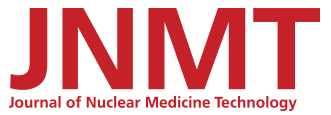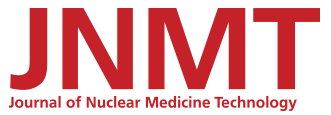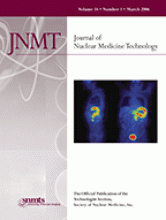
VALERIE R. CRONIN, CNMT, FSNMTS
The Society of Nuclear Medicine Technologist Section is meeting the future head on: its officers have deliberated—and support—baccalaureate degree entry-level requirements for nuclear medicine technologists (NMTs) and the development of a master's degree–level nuclear medicine practitioner (NMP). These two initiatives will help us build our future, ensuring continued success for the nuclear medicine profession.
SNMTS leaders discussed these two initiatives at a fall 2005 education summit in Reston, VA, welcoming educators from certificate, associate, and baccalaureate programs as well as representatives from accrediting and professional organizations in the radiological sciences.
Summit participants examined education requirements and competencies needed for both the entry-level NMT and an advanced NMP. Our National Council of Representatives (NCOR), the SNMTS Executive Board, and SNM's board of directors approved position papers for both ideas at the society's Annual Meeting last summer. Summit participants realized the importance of developing a core curriculum and of bridging associate and certificate programs to a bachelor of science degree. It was also agreed that becoming an advanced NMP would involve earning a master's degree.
SNMTS is especially grateful to the Professional Development and Education Fund, which has provided a $20,000 grant for the development of CT educational programs for technologists and two grants in the amount of $20,000 each for implementing the NMP program, which may be available as early as the 2007 fall term.
SNMTS has observed that new advancements in multimodal imaging and therapy—and increasing demands for accountability—require increasing levels of skill and knowledge not easily delivered within the current structure of entry-level educational programs. The summit allowed SNMTS officers to discuss the obstacles to implementing new recommendations about entry-level requirements and to brainstorm methods to implement such requirements.
Baccalaureate entry-level requirements will not affect current NMTs and will need to satisfy educational progression needs for those moving to the NMP level. This “2+2” model—two years of general studies plus two years of professional curriculum—was identified as the most suitable baccalaureate model. Core curriculum and general education requirements to meet these needs were identified and discussed. Attendees produced a draft curriculum of 121–124 hours for an entry-level program that consists of prerequisites, core curriculum, professional technical courses, and electives.
Summit attendees discussed the importance of NMTs achieving competence in the molecular sciences and of becoming technically competent, well-rounded, critical thinkers. It was voiced that to achieve professional status in the eyes of the federal government, the profession must require a bachelor's degree for entry level and that technologists need to be involved in lifelong learning.
SNMTS would like to have the new standards in place by 2010 and all NMT programs apply the baccalaureate degree by 2015. Subgroups were appointed to focus on programmatic transition, core curriculum, collaborating with external stakeholders, and outreach to the nuclear medicine community.
As part of its most recent strategic plan, SNMTS was charged with evaluating the need and the desire for an advanced level of clinical practice for NMTs. As the profession of nuclear medicine has matured and changes in health care have occurred over the past years, many NMTs have taken on roles in the clinical practice setting that are generally considered over and above the entry-level practice domain. Today, technologists may be asked (under the supervision of a physician) to administer interventional drugs, stress and monitor cardiac patients, and/or obtain an informed consent for specified procedures. NMTs must acquire new skills to keep up with technically complex SPECT and PET imaging in the new world of molecular imaging. Technologists and physicians have been surveyed about—and are supportive of—the development of an advanced nuclear medicine practitioner.
Summit participants discussed the competencies and curricular requirements for developing a master's degree–level NMP program—a new level of opportunity for SNMTS members. It was agreed that the curriculum will be geared toward a general practitioner—rather than a specialist—and that the length of the program should be approximately two years.
As this issue went to press, NCOR and Executive Board members were set to discuss the proposed competencies at our Mid-Winter Educational Symposium.







